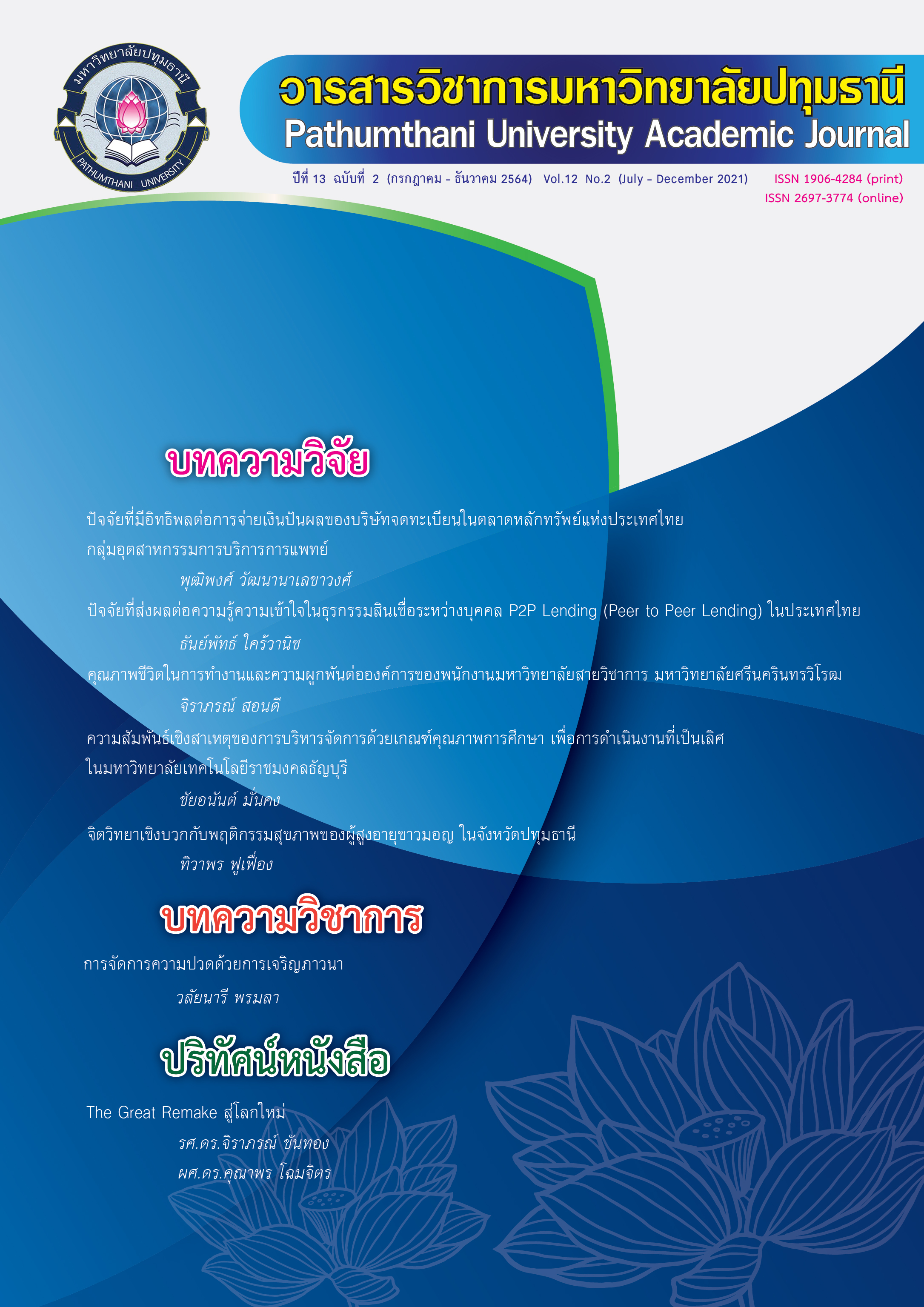รูปแบบภาวะผู้นำใฝ่บริการของผู้บริหารสถานศึกษา สังกัดสำนักงานคณะกรรมการการอาชีวศึกษา
คำสำคัญ:
รูปแบบภาวะผู้นำใฝ่บริการ, ผู้บริหารสถานศึกษา, สำนักงานคณะกรรมการการอาชีวศึกษาบทคัดย่อ
การวิจัยครั้งนี้มีวัตถุประสงค์เพื่อ สร้าง พัฒนา และประเมินความเป็นไปได้ของรูปแบบภาวะผู้นำใฝ่บริการ ของผู้บริหารสถานศึกษาสังกัดสำนักงานคณะกรรมการการอาชีวศึกษา เป็นการวิจัยแบบผสมวิธีกรอบแนวคิดของงานวิจัยนี้ได้สร้างขึ้นโดยประยุกต์ แนวคิดและหลักการพัฒนารูปแบบภาวะผู้นำใฝ่บริการของ Greenleaf, Spears & Lawrence, Page & Wong และ Spears ประชากรเป้าหมาย คือ ผู้บริหารสถานศึกษา ครู สังกัดสำนักงานคณะกรรมการการอาชีวศึกษา จำนวน 45 คน ผู้เชี่ยวชาญและผู้ทรงคุณวุฒิ จำวน 20 คน และใช้วิธีการเลือกแบบเจาะจง เครื่องมือที่ใช้ในการวิจัย ได้แก่ แบบสัมภาษณ์เชิงลึก แบบสอบถามการสนทนากลุ่ม และการประเมินความเหมาะสมและความเป็นไปได้มีค่าความเชื่อมั่นของแบบสอบถามทั้งฉบับ .89 สถิติที่ใช้ในการวิเคราะห์ข้อมูลเชิงปริมาณ คือ ค่าเฉลี่ย และค่าส่วนเบี่ยงเบนมาตรฐาน ส่วนข้อมูลเชิงคุณภาพใช้วิธีการวิเคราะห์เนื้อหา
ผลการวิจัยพบว่า 1. รูปแบบภาวะผู้นำใฝ่บริการของผู้บริหารสถานศึกษา ด้านการมีความรู้สึกร่วมและเห็นคุณค่าผู้อื่น กล่าวคือ จะต้องเป็นผู้ฟังที่ดี และพร้อม ที่จะรับฟังผู้อื่นอย่างจริงใจ โดยจะต้องเป็นผู้ที่สนใจและพร้อมรับฟังความคิดเห็นของผู้อื่นอย่าง จริงใจ สามารถทำให้ผู้อื่นรู้สึกอยากจะแสดงความคิดเห็น และเชื่อว่าเมื่อแสดงความคิดเห็นนั้นแล้ว จะเป็นที่รับฟังจากตัวผู้นำเอง 2. ผลการพัฒนาการพัฒนารูปแบบภาวะผู้นำใฝ่บริการของผู้บริหารสถานศึกษา พบว่า รูปแบบภาวะผู้นำใฝ่บริการของผู้บริหารสถานศึกษาสังกัดสำนักงานคณะกรรมการการอาชีวศึกษา มีความเหมาะสมทุกด้าน 3. ผลการประเมินความเป็นไปได้ของการพัฒนารูปแบบภาวะผู้นำใฝ่บริการของผู้บริหารสถานศึกษาสังกัดสำนักงานคณะกรรมการการอาชีวศึกษา โดยรวมมีความเป็นไปได้อยู่ในระดับมากที่สุด และเมื่อเรียงลำดับจากมากไปน้อย ได้แก่ 1) การสร้างมโนทัศน์ 2) การมองการณ์ไกลการสร้าง 3) การสร้างวัฒนธรรมการทำงาน และลำดับสุดท้ายคือ การรับผิดชอบดูแล
เอกสารอ้างอิง
เพิ่ม กอมณี. (2545, กรกฎาคม-ธันวา). “การพัฒนาและการถ่ายโอนบุคลากรภาครัฐ: จุดเปลี่ยนผันสู่ราชการยุคใหม่”. จุลสารพัฒนาข้าราชการพบเรือน. ปีที่ 21 ฉบับที่ 3. หน้า 7-11.
ศศิรดา แพงไทย. (กันยายน, 2562). “รูปแบบภาวะผู้นำเชิงสร้างสรรค์ของผู้บริหารสถานศึกษา สังกัด สำนักงานเขตพื้นที่การศึกษาประถมศึกษาขอนแก่น เขต 2”. วารสารมหาจุฬานาครทรรศน์. ปีที่ 6 ฉบับที่ 7. หน้า 3299
สมบัติ นพรัก และจิติมา วรรณศรี. (2553, กรกฎาคม-ธันวาคม). “รูปแบบการพัฒนาความคิดสร้างสรรค์ของผู้บริหารสถานศึกษาขั้นพื้นฐาน = The creative thinking development model of basic educational institution principals”. วารสารศึกษาศาสตร์ มหาวิทยาลัยนเรศวร. ปีที่ 12 (ฉบับที่ 3), หน้า 1-17.
สำนักงานคณะกรรมการพัฒนาการเศรษฐกิจและสังคมแห่งชาติ. (2554). แผนพัฒนาเศรษฐกิจและสังคม แห่งชาติ ฉบับที่ 11. กรุงเทพมหานคร : สำนักงานคณะกรรมการพัฒนาการเศรษฐกิจและสังคมแห่งชาติ.
สำนักงานคณะกรรมการการอาชีวศึกษา. (2561). มาตรฐานการอาชีวศึกษา. กรุงเทพมหานคร : ม.ป.พ.
อุมาพร บุญญาวิโรจน. (2538). คุณลักษณะที่พึงประสงค์ของผู้บริหารโรงเรียนเทศบาลในทัศนะ ของผู้บริหารเทศบาล ผู้ปกครองและครูโรงเรียนเทศบาล ในเขตการศึกษา 2. วิทยานิพนธ์ปริญญาศึกษาศาสตรมหาบัณฑิต, มหาวิทยาลัยสุโขทัยธรรมาธิราช.
Block, P. (1993). Stewardship: Choosing service over self-interest. San Francisco, CA: ฃ Berrett-Koehler.
Certo, S. C. (2006). Modern management. Upper Saddle River, N.J: Pearson Prentice Hall.
Greenleaf, R. K. (1976). The institution as servant. IN: Publication of the Greenleaf Center.
Johnson, B.& Christensen, L. (2004). Educational Research: Quantitative, Qualitative, and Mixed Approach. (2nd ed.). Boston: Pearson Education.
Maxwell, J. C. (1998). The 21 irrefutable laws of leadership: Follow them and people will follow you. Nashville, TN: Thomas Nelson Publishers.
Spear, L.C. (2004). “Practicing servant leadership,” Leader to Leader. Fall 2004 (No.34), pp.7-11.
Stogdill, R.M. (1974). Handbook of Leadership: A survey of theory and research. New York: Free Press.
Yukl, G. A. (2002). Leadership in organizations. (5th ed). New Jersy: Prentice-Hall.
ดาวน์โหลด
เผยแพร่แล้ว
รูปแบบการอ้างอิง
ฉบับ
ประเภทบทความ
สัญญาอนุญาต
บทความที่ได้รับการตีพิมพ์เป็นลิขสิทธิ์ของวารสารมหาวิทยาลัยปทุมธานี
ข้อความที่ปรากฎในบทความแต่ละเรื่อง เป็นความคิดเห็นส่วนตัวของผู้เขียน กองบรรณาธิการไม่จำเป็นต้องเห็นด้วยเสมอไป และไม่มีส่วนรับผิดชอบใด ๆ ถือเป็นความรับผิดชอบของผู้เขียนแต่เพียงผู้เดียว



